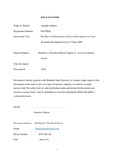Please use this identifier to cite or link to this item:
https://cris.library.msu.ac.zw//handle/11408/3306| Title: | The ease of doing business policy and its impact on local economic development: case of Vungu Rural District Council’ | Authors: | Chakara, Amanda | Keywords: | Local governance Local economic development Zimbabwe Zimbabwean local governance |
Issue Date: | 2018 | Publisher: | Midlands State University | Abstract: | Over a period of time many obstacles that comprises of high taxes and rates,long registration and licensing process and policy adjustments has continuously mystified in both urban and rural local authorities in Zimbabwe. These challenges have further potrayed the Zimbabwean local governance in a bad picture creating an environment that is non favourable in doing business. It is the main pupose of this study to analyse the E.O.D.B.P in detail and its impact on LED using Vungu RDC as the case study.The research was aimed at examining the contribution of the E.O.D.B.P on LED identifying the aspects of the Ease of Doing Business Policy implemented , examining the impact of the Ease of Doing Business Policy in terms of Local Economic Development and establishing factors that contribute to success as well as the failures of the Ease of Doing Business Policy on Local Economic Development in Vungu Rural District.Although this study was mainly based in Zimbabwe it also used other countries that include Egypt and Zambia in a bid to analyse on how the E.O.D.B.P is being implemented and the other policies that are being used to create a conducive business environment.The research employed qualitative and quantitative data analysis in collecting data.The study was targeting a sample of 50 respondents including the council officials and the business people in Chiundura (ward 12& 13),Lower Gweru (ward 3 &8) ,Somabhula (ward 15)and Tree tops in Vungu Rural District.Probability and Non-Probability sampling techniques were used for data presentation and analysis which are purposive and stratified sampling techniques.In total 50 questionnaires were distributed to the council officials and the business communities in Somabhula,Chiundura,Treetops and Lower Gweru and the response rate was 68%.Primary and secondary data collection were combined through questionnaires and the findings concluded that positive changes were bought about by the E.O.D.B.P on Local Economic development with the people operating in a conducive business environment and a sense of ownership of the community is promoted.Observations made during the data collection shows that infrastructural development plays a pivotal role in creating a conducive business environment and in promoting Local Economic Development.The researcher recommend among other things that there should be an effective communication and team work between the Central Government of Zimbabwe and the Local Authorities and between the Local Authorities and the business community for the promotion of Local Economic Development and the creation of a favourable business environment. | URI: | http://hdl.handle.net/11408/3306 |
| Appears in Collections: | Bsc Local Governance Studies Honours Degree |
Files in This Item:
| File | Description | Size | Format | |
|---|---|---|---|---|
| R147059X LGS DISSER.pdf | Full Text | 2.09 MB | Adobe PDF |  View/Open |
Page view(s)
192
checked on Feb 26, 2025
Download(s)
212
checked on Feb 26, 2025
Google ScholarTM
Check
Items in MSUIR are protected by copyright, with all rights reserved, unless otherwise indicated.


